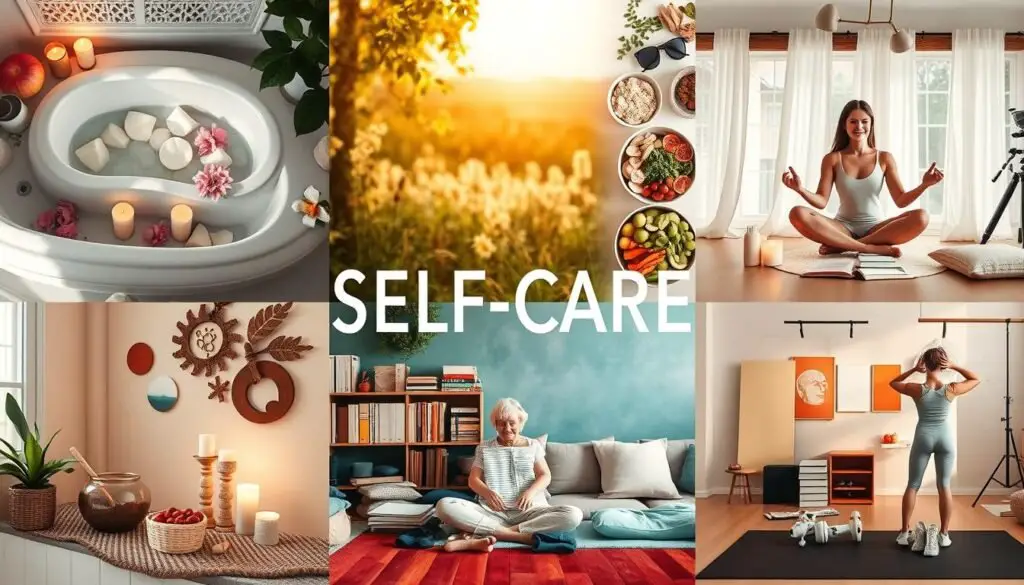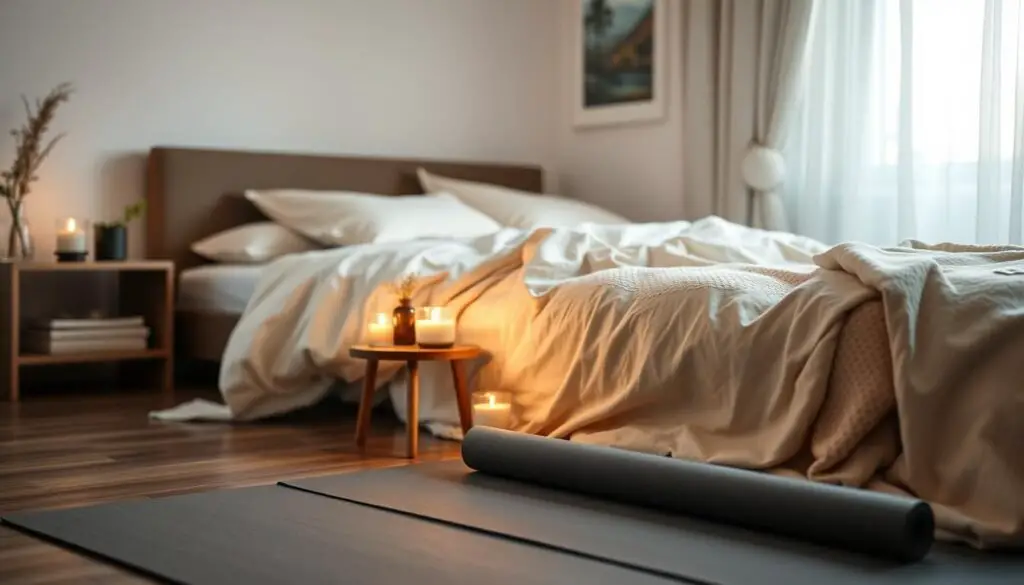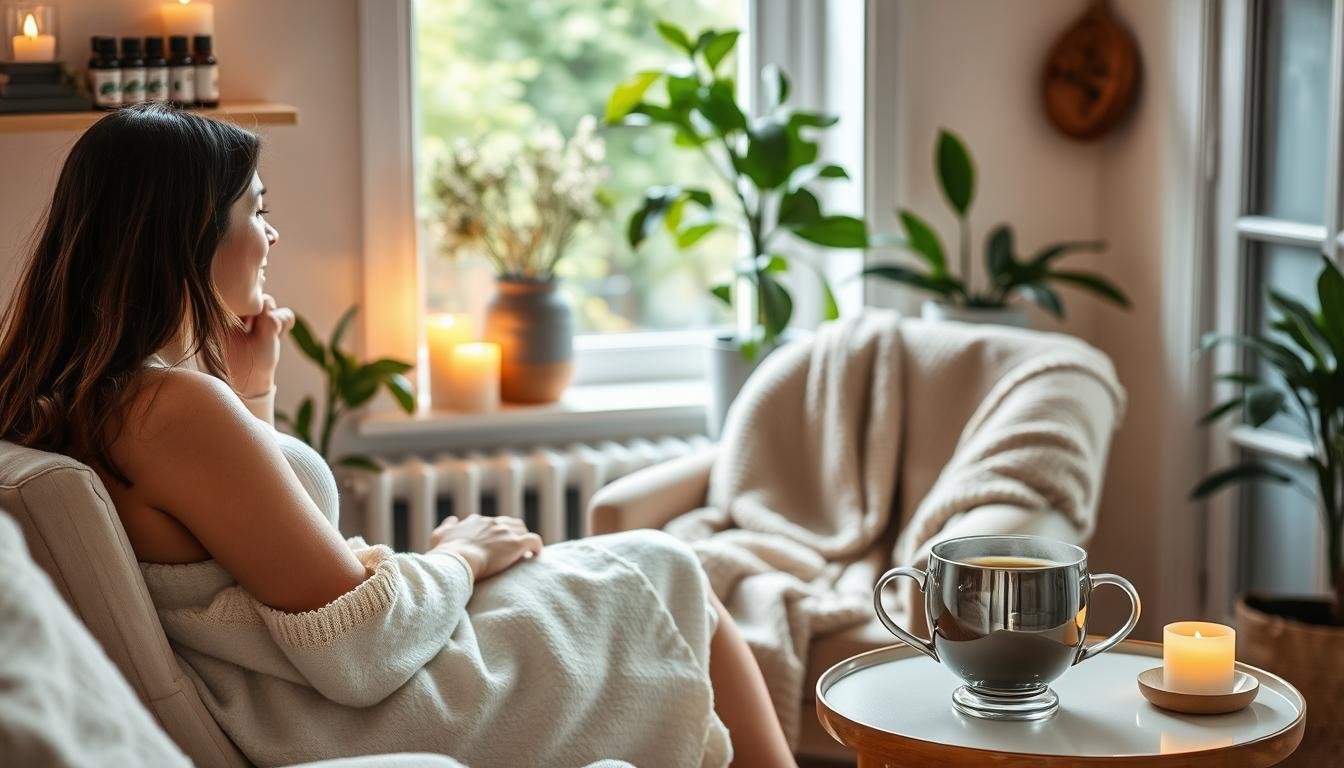Modern women often feel like they can’t fit self-care into their busy lives. But, self-care is essential for our well-being. It helps us stay healthy, balance work and life, and feel less stressed.
To make self-care a priority, treat it like any other important task. Schedule it in your calendar. Create a “self-care menu” with activities that fit your busy schedule.
The best self-care routines blend into your daily life. Instead of adding more tasks, find ways to make self-care part of what you already do. Even small moments, like deep breathing or enjoying a meal, can make a big difference.
Key Takeaways
- Prioritize self-care as a non-negotiable part of your daily routine
- Create a personalized “self-care menu” to cater to different time constraints
- Integrate self-care activities seamlessly into your existing lifestyle
- Establish a consistent morning routine to set a positive tone for the day
- Seek support from friends, family, or professional services to maintain self-care practices
Understanding the Importance of Self-Care for Modern Women
In today’s fast world, self-care is key for modern women. It helps keep minds and bodies healthy. By following mental wellness routines, using stress management techniques, and adopting healthy lifestyle habits, women can feel better.
Physical and Mental Health Benefits
Self-care, like exercise and good sleep, boosts health. It gives more energy and a stronger immune system. It also helps with anxiety and stress, making it easier to focus.
Impact on Work-Life Balance
Self-care helps balance work, family, and social life. It lets women handle many roles better. This improves job performance and personal relationships.
Stress Reduction and Emotional Well-being
Self-care is great for managing stress and emotions. Activities like meditation help women deal with life’s demands. This leads to better emotional stability and decision-making.
“Taking care of myself is not self-indulgence, it is self-preservation, and that is an act of political warfare.” – Audre Lorde

In conclusion, self-care is vital for modern women. It ensures physical, mental, and emotional health. This leads to success in work and life, with a good balance.
Creating a Sustainable Morning Self-Care Practice
Finding time for self-care in a busy life can seem hard. But, starting your day with a routine that cares for your mind and body can make a big difference. For working moms, adding mindfulness and gentle exercises to your morning can greatly improve your well-being.
Begin by setting aside 10-15 minutes each morning for yourself. This could be a quick meditation or a simple yoga routine. Choose something that makes you feel good and energized. Busy women often prefer quick workouts like HIIT or yoga to boost their mood and reduce stress.
To keep your self-care routine going, mark it in your calendar like any other important meeting. Learn to say no and delegate tasks to protect this time. Having a supportive group that backs your self-care efforts is also key. Celebrate every small victory, not just the big ones.
The aim is not to have a perfect routine but a consistent one that feeds your body, mind, and spirit. By making small, thoughtful choices each morning, you can feel calm and refreshed all day. Embrace a mindful morning routine to unlock the amazing benefits of self-care.
| Self-Care Tip | Benefit |
|---|---|
| 5-Minute Morning Routine | Kickstarts the day with intention and focus |
| Digital Detox | Reduces stress and promotes mindfulness |
| Set Boundaries | Preserves energy and protects time for self-care |
| Long-Term Habits Building | Fosters sustainable, transformative self-care practices |
| Personalization | Ensures self-care activities are aligned with individual preferences |
| Progress Tracking | Promotes accountability and celebrates growth |
By using these tips in your morning routine, you can build a lasting self-care practice. Remember, even small steps can make a big difference in caring for yourself and living a healthier life.

“The greatest weapon against stress is our ability to choose one thought over another.” – William James
Self-care Routines for Busy Women
Busy women often forget to take care of themselves. But, it’s key to keep our bodies, minds, and spirits healthy. Quick and simple self-care routines can help us find balance and improve our lives.
Quick and Effective Routines
Begin your day with a 10-minute meditation or a quick walk. These small steps can make you feel more grounded and awake. Take short breaks to breathe deeply or enjoy a healthy snack. Even small acts, like using hand cream or getting some fresh air, can be refreshing.
Incorporating Mindfulness
Mindfulness is easy to add to your day. Try eating mindfully during lunch, enjoying each bite. Use your commute for a quick breathing exercise. You can even find calm while doing chores or errands.
Time Management Strategies
Good time management is essential for self-care. Use time-blocking to set aside self-care time. Delegate tasks to free up your schedule. Learn to say “no” to things that drain your energy, so you can focus on what’s important.
By using these quick and mindful self-care routines, busy women can stay well and succeed in all areas of life.

The Seven Types of Self-Care Every Woman Should Know
Self-care isn’t one size fits all. There are seven types every busy woman should know. Each type helps you care for yourself in different ways. This way, you can make a self-care plan that fits you perfectly.
Emotional Self-Care
Emotional self-care is about dealing with your feelings. You might journal, go to therapy, or just take time to feel your emotions. Studies show it helps you cope better and feel happier.
Practical Self-Care
Practical self-care is about avoiding stress. It’s things like meal prep, cleaning, or picking out clothes ahead of time. These small tasks can make a big difference in your mental health.
Physical Self-Care
Physical self-care is about keeping your body healthy. This can be as simple as going for a walk or getting a massage. The American Heart Association says it helps prevent diseases.
Mental Self-Care
Mental self-care is about keeping your mind sharp. Listening to podcasts, trying new things, or reading are all good ways to do this.
Social Self-Care
Being social is key to our happiness. Social self-care is about spending time with loved ones. It helps you feel supported and connected.
Spiritual Self-Care
Spiritual self-care is about connecting with your inner self. It can be meditation, prayer, or anything that brings you peace. It’s about finding comfort in your daily life.
Professional Self-Care
Professional self-care is about feeling good at work. It means taking breaks, setting limits, or doing things outside of work. It helps prevent burnout.
Knowing these seven types of self-care helps busy women create a complete self-care plan. It supports their overall well-being.

“Self-care is not selfish. You cannot serve from an empty vessel.” – Eleanor Brownn
Making Self-Care Non-Negotiable: Practical Strategies
In today’s world, women often have a lot on their plates. Self-care can get pushed aside. But, it’s key to make it a must-do in your daily life. By using simple strategies, you can focus on your health and find a better balance between work and life.
Setting Boundaries
Setting clear boundaries is a great way to prioritize self-care. Learn to say “no” to things that take too much of your time and energy. This helps you protect your self-care time and say yes to what’s truly important.
Creating Daily Rituals
Creating daily self-care rituals is a powerful way to make self-care a regular part of your life. It could be a morning meditation, a skincare routine, or a short walk in the afternoon. These small actions can greatly improve your well-being. See self-care as a necessary part of your day, not something extra.
By making your schedule simpler and adding self-care activities that make you happy, you can live a healthier life. Remember, setting boundaries and creating daily rituals are key to taking care of yourself. They help you succeed in every area of your life.
| Self-Care Rituals | Benefits |
|---|---|
| Morning Meditation | Reduces stress, enhances focus, and promotes a sense of calm |
| Journaling | Facilitates emotional processing, self-reflection, and personal growth |
| Afternoon Tea Break | Provides a moment of mindfulness, relaxation, and rejuvenation |
| Evening Skincare Routine | Supports skin health, promotes relaxation, and signals the body to wind down |

Maximizing Your Lunch Break for Self-Care
It’s easy to let your lunch break go by without taking time to recharge. But, taking this midday pause can change your life. By adding lunch break self-care to your routine, you can feel more energized, less stressed, and more productive in the afternoon.
Begin by stepping away from your desk for a mindful walk. Take a stroll around the block or in a nearby park. This simple act can greatly improve your mental and physical health. If walking isn’t your thing, try reading a chapter of an inspiring book or listening to a calming mindfulness exercise.
Another great way to use your lunch break is to practice mindful eating. Enjoy every bite of your meal, focusing on the flavors, textures, and smells. This can make your meal more enjoyable and help you feel more grounded and present.
| Lunch Break Self-Care Activities | Benefits |
|---|---|
| Taking a Rejuvenating Walk | Increases physical activity, boosts mood, and reduces stress |
| Reading a Book | Provides mental stimulation, promotes relaxation, and enhances focus |
| Practicing Mindful Eating | Supports mindfulness, improves digestion, and encourages a healthy relationship with food |
| Listening to Calming Music | Reduces stress, improves mood, and promotes relaxation |
By making self-care a priority during your lunch break, you’ll return to work feeling refreshed and energized. You’ll also be better prepared to handle any stress management techniques that come your way.

“Taking a break during the workday is crucial for maintaining your physical and mental well-being. Don’t let your lunch break go to waste – use it as an opportunity to recharge and rejuvenate.”
Evening Wellness Routines for Working Women
Working women need to unwind after a long day. Good evening self-care, relaxation, and sleep hygiene are key. They help you relax and sleep better.
Relaxation Techniques
Try simple relaxation techniques in the evening. Deep breathing, stretching, or meditation can calm your mind and body. They help you switch from work mode to relaxation.
Sleep Hygiene Tips
Good sleep hygiene is vital for rest. Stick to a sleep schedule, even on weekends. Make your bedroom comfy and avoid screens before bed.
Do calming activities like reading or yoga to relax. This helps you prepare for sleep.
| Relaxation Technique | Benefits |
|---|---|
| Deep Breathing Exercises | Reduces stress and anxiety, lowers blood pressure, and promotes relaxation. |
| Gentle Stretching | Improves flexibility, releases muscle tension, and encourages mindfulness. |
| Meditation | Enhances focus, reduces negative thoughts, and cultivates a sense of inner peace. |

“Setting aside time for relaxation and self-care in the evenings can have a profound impact on your overall well-being. It’s an investment in your mental and physical health that will pay dividends in the long run.”
Adding these evening routines to your life can make a big difference. They help you relax and prepare for a good night’s sleep. This balance is key to a healthier life.
Simple Self-Care Activities That Take 10 Minutes or Less
Our lives are always busy, making it hard to find time for self-care. But, quick and easy self-care practices can greatly improve our well-being. Here are some simple activities that can be done in just 10 minutes or less.
Physical touch, like hugs, can make us feel better and reduce stress. Connecting with friends or loved ones can lift our mood. Being thankful also has benefits, like better sleep and less depression.
For a quick mental break, try listening to a favorite song or doing something creative. Simple physical self-care, like stretching or a short walk, can also help. Even small acts, like enjoying herbal tea or deep breathing, can calm our minds and bodies.
Quick Self-Care Routines to Try
- Practice 5-10 minutes of mindful meditation
- Do a series of desk exercises or a quick yoga flow
- Write down 3-5 things you’re grateful for
- Read a few pages of an inspiring book or magazine
- Enjoy a healthy snack while savoring each bite
- Take a short walk outside to connect with nature
- Try a facial massage or apply a nourishing face mask
- Listen to an uplifting podcast or motivational audio
Find self-care activities that you enjoy and make them a daily habit. Small steps in self-care can lead to big improvements in your health and happiness.

“Self-care is never a selfish act – it is simply good stewardship of the only gift I have, the gift I was put on earth to offer to others.” – Parker Palmer
| Self-Care Activity | Time Commitment | Key Benefits |
|---|---|---|
| Gratitude Journaling | 5-10 minutes | Boosts happiness and positive emotions |
| Mindful Stretching | 10 minutes | Reduces anxiety and promotes calm |
| Taking a Walk | 15 minutes | Improves concentration and energy |
| Enjoying a Healthy Beverage | 5-10 minutes | Promotes physical and mental well-being |
Balancing Professional Success with Personal Well-being
Modern women aim for career success while keeping a healthy work-life balance. It’s key to focus on self-care and stress management. This way, you can grow in your career and keep your personal life healthy. Here are some tips to find the right balance:
- Set Clear Boundaries: Make clear lines between work and personal time. Don’t check emails or take work calls outside work hours. This lets you fully disconnect and recharge.
- Practice Professional Self-care: Take breaks during the day, even just a few minutes to stretch or get some fresh air. Delegate tasks to manage your workload better.
- Optimize Time Management: Learn to manage your time well to be more productive at work. This frees up time for personal activities and self-care.
- Recognize and Address Burnout: Watch for burnout signs like fatigue, loss of motivation, and job dissatisfaction. Plan a vacation or seek help from colleagues or a mental health professional to tackle these issues.
- Cultivate Hobbies and Interests: Do things outside work that you enjoy and find fulfilling. Whether it’s a hobby, physical activity, or socializing, a well-rounded life boosts your well-being and helps maintain balance.
By focusing on work-life balance, self-care, and stress management, you can succeed in both your personal and professional life. This approach leads to lasting success and happiness.
| Recommendation | Benefit |
|---|---|
| Aim for 7-9 hours of quality sleep per night | Improved cognitive function, energy levels, and overall health |
| Create a bedtime routine to prepare your brain for sleep | Enhanced sleep quality and reduced stress levels |
| Avoid screens for at least an hour before bedtime | Better sleep quality and reduced eye strain |
| Drink at least one liter of water daily | Improved hydration, focus, and overall physical well-being |
| Engage in regular physical activity | Increased energy, reduced stress, and enhanced overall health |
By using these self-care strategies, you can achieve a balance between professional success and personal well-being. This leads to a more fulfilling and sustainable lifestyle.

“A survey conducted among women professionals revealed that 85% reported feeling overwhelmed by the pressure to excel in both their personal and professional lives.”
Creating Your Personal Self-Care Menu
As busy women, making time for self-care can be tough. But it’s key for our health. A personalized self-care menu helps you add nourishing activities to your day. It should mix emotional and physical self-care that makes you happy and relaxed.
Emotional Self-Care Activities
- Journaling to process thoughts and emotions
- Scheduling regular therapy or counseling sessions
- Spending quality time with loved ones
- Practicing mindfulness or meditation
- Engaging in creative hobbies like painting or writing
Physical Self-Care Options
- Incorporating short exercise routines, such as 15 minutes of yoga or a brisk walk
- Scheduling relaxing activities like a massage or a haircut
- Spending time in nature, such as a hike or a visit to a local park
- Trying new physical activities that energize and challenge you, like dance classes or rock climbing
- Focusing on sleep hygiene with a consistent bedtime routine
Your self-care menu should fit your unique needs and likes. Update it often to keep it fresh and relevant. By caring for yourself, you’ll handle life’s demands better and keep a healthy balance between work and life.
“Self-care is not selfish, it’s essential. When you take care of yourself, you’re better able to take care of those around you.”
Digital Detox: Managing Screen Time for Better Self-Care
In today’s world, it’s easy to get lost in screens. We’re bombarded with notifications and endless scrolling. But, finding a balance between our digital and real lives is key for our well-being. Taking a digital detox can help us take back our time, lower stress, and improve our mental health.
Americans spend four hours watching TV and seven-and-a-half hours on digital devices daily. Too much screen time can harm our health, leading to anxiety, depression, and bad sleep. To fight these issues, we need to manage our screen time and create screen-free areas in our lives.
- Set times to check emails and social media. Make certain hours or areas in your home “tech-free,” like during meals or before bed.
- Use apps and tools to track and limit your screen time. Many devices now have built-in features to monitor and control your digital use.
- Be mindful of your online activities. Ask yourself if what you’re doing online is really worth it or adds value to your life.
- Do things offline to balance your digital use. Try hobbies, go outside, read books, or spend time with people face-to-face.
- Try digital detox periods, like a weekend or a week without devices. This can help you feel more connected to yourself and the world around you, reducing stress and improving your well-being.
By using these strategies, you can take charge of your digital life and focus on your mental health. Remember, finding a balance between our online and offline lives is crucial for our happiness and self-care.
| Metric | Global Average |
|---|---|
| Smartphone Usage per Day | 4 hours |
| Social Media Usage per Day | 2 hours |
“Since November 2021, I’ve consciously set healthier boundaries with social media, and I’ve noticed a significant difference in my overall mood and positivity. The changes I’ve made have completely transformed how I feel.”
Going on a digital detox can change your life. It lets you step away from constant digital noise and connect with yourself and the world. By managing our screen time and focusing on our mental health, we can have a healthier relationship with technology.
Building a Support System for Sustainable Self-Care
Keeping up with self-care can be tough, especially for busy women. They have to balance work, family, and personal life. The solution is to build a strong support system. This helps you stay on track and motivated.
Begin by telling your closest friends, family, or partner about your self-care goals. Their support and understanding can greatly help. You might also want to join or start a self-care group. Here, you can meet others who care about self-care, share ideas, and support each other.
If you face self-care hurdles, don’t be afraid to ask for help. Therapists, life coaches, or healthcare providers can offer great advice. They can help you find a better balance between work and life, and teach you how to keep up with self-care routines.
Try to hand over tasks at home or work when you can. This gives you more time for self-care and finding a better work-life balance. Make sure to tell your loved ones, colleagues, or boss about your self-care needs. This way, they’ll know to respect and protect your self-care time.
“Consistent self-care is not selfish – it’s essential for your overall well-being and ability to show up for the people and responsibilities in your life.”
By creating a supportive network and standing up for your self-care, you can live a life that nourishes your mind, body, and spirit. This leads to more happiness and success in both your personal and professional life.
Overcoming Common Self-Care Challenges
Modern women face many challenges, like work, family, and personal duties. Finding time for self-care seems impossible. But, it’s key to overcome these hurdles for our well-being and lasting success.
Time Management Solutions
Time is often the biggest barrier to self-care. To beat this, try prioritizing tasks and using time-blocking. Waking up early can also help you find time for self-care.
By cutting out unnecessary commitments, you can make more time for yourself. This allows you to focus on your physical, mental, and emotional health.
Dealing with Guilt
Feeling guilty about self-care is common. Many women think it’s selfish or unproductive. But, self-care is vital for your well-being and work performance.
Start small with self-care goals. Remember, your routine is personal and needs to be tailored to you. Be realistic and say no to tasks that aren’t essential. This way, you can prioritize your needs without feeling guilty.
FAQ
What are the benefits of self-care for busy women?
Self-care boosts mental health by lowering anxiety and stress. It also helps with depression. It makes you more focused and productive at work.
It also improves physical health by giving you more energy. You’re less likely to get sick. Self-care balances work, family, and social life, making you feel better overall.
How can I incorporate self-care into my morning routine?
Start your day with a routine that makes you feel good. Try meditation, journaling, or light exercise. Wake up a bit earlier for this.
Make your routine fit your life, like stretching while kids eat or doing skincare. A consistent morning routine makes you feel accomplished and calm.
What are the different types of self-care?
There are seven types of self-care. Emotional self-care helps you understand your feelings. Practical self-care prevents stress.
Physical self-care is about your body. Mental self-care keeps your mind sharp. Social self-care strengthens relationships. Spiritual self-care connects you to something bigger. Professional self-care supports your career.
How can I protect my self-care time?
Set clear boundaries at work and home to keep self-care time. Learn to say no to things you don’t need to do. Create daily rituals like a skincare routine or meditation.
Treat self-care as a must, not a luxury. Simplify your schedule to make time for activities that bring you joy.
How can I incorporate self-care into my workday?
Use your lunch break for self-care. Take a walk, read, or listen to music. Don’t work or do errands during this time.
Enjoy your meal with mindful eating. Use this time to recharge and boost your energy. Try relaxation techniques or quick meditation.
What are some quick and effective self-care routines?
Add brief self-care activities to your day. Try deep breathing, stretching, or herbal tea. Use affirmations or journaling for mental care.
Take short walks or do desk exercises for physical care. Listen to a favorite song or podcast for a mental break. These small acts can greatly improve your well-being.
How can I build a strong support system for my self-care?
Build a strong support system for self-care. Share your goals with friends and family for accountability. Join or create a self-care group for support.
Seek professional help when needed. Delegate tasks to have more time for self-care. Communicate your needs to respect your self-care time.
How can I overcome common obstacles to self-care?
Overcome obstacles like lack of time or guilt. Use time management techniques or wake up earlier. Reframe self-care as essential for well-being and productivity.
Start with small, achievable goals. Learn to say no to non-essential commitments. Remember, self-care is necessary for success.

One Reply to “Self-care Routines for Busy Women: Time-Saving Tips”